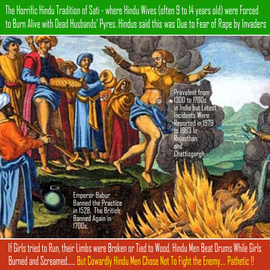HORRORS OF HINDUISM
The ancient Hindu tradition called ‘Sati’, wherein a widow would burn herself to death on her husband’s pyre, was initially a voluntary act that was considered to be quite courageous and heroic, but it later became a forced practice. Sati has a rather dark history of India.
The practice of Sati was prohibited many times between 15th and 18th centuries. In 1500, Mughal Emperor Akbar outlawed Sati, and in 1663, Aurangzeb tried to end it again. Even the Portuguese, French and British, who came to India during the European colonial period, tried to stop Sati. In 1850, the British hardened their rules against the practice. Sir Charles Napier ordered to hang to death any Hindu priest who presided over a widow burning.


Enjoy being online again!
Welcome to the community of good people who base their values on evidence and appreciate civil discourse - the social network you will enjoy.Create your free account
5 comments
Feel free to reply to any comment by clicking the "Reply" button.I had no idea this had happened as recently as 1983. That was the year I was born, its disconcerting to think that it happened during my lifetime.
I live on a city with an extremely large proportion of Hindus and Indian migrants, they are so well integrated here as a community that it's hard to believe there could have been Indians somewhere in the world that still practiced this.
I came across something about India in relation to widows. In some parts there widows are driven out of the house by the dead husbands relations.
That is correct. Even today, some towns have places built outside town for them called Vidhawa Ashram or Widow Sanctuary. Widows are expected to wear white sarees and in the old days they were required to shave their heads, not as much today. It is considered a bad omen for them to invite people for ceremonies like weddings, receptions etc. even of their own children. In such as a case, an uncle of a male relative will be the official inviter.
The customs are horrific, The widow customs are followed in conservative states. Gujarat is one of them.
I have seen it all up close. My mother was a widow, she was more educated, more able, well spoken but I saw she could not escape this stupidity in that place. When she arrived in the United States to visit us the first time, I remember saying to her, "Mom you would have accomplished so much in the U.S. with this freedom." Her response was... "In the next life son, next life."
We are talking here about an Indian funeral custom that clashes with our Western values. I’m not sure if that custom is an example of the “horrors of Hinduism” as a religion. “Hindu” just means “Indian”. The traditional religion of India is a very disjointed thing, having no organization or central authority.
- Where did you hear or read that Hindu means Indian?
- The tradition of religion in India is not very disjointed, it does not have one central authority but Hinduism has 4 Peeth or commands that often come together for critical issues
- India has over 86% Hindus but it is the birthplace of 4 religions in the world including Buddhism and holds more Muslim population in one country than any nation in the world except in Malaysia
- The Sati funeral custom is just one example of the horrors of Hinduism, just like there are other horrors in Islam and Christianity
Western values? Since when does forcing women by breaking their bones and tying them to the funeral pyre align with any values? I think maybe it aligns with the values of sickos....
"Forced to burn alive"... that goes WAAAAAAAY beyond "clashes with our Western values"!!!
@St-Sinner I’m sure you know more about it than I do, especially if your mother was Indian. I have read in various places that the word “Hindu” did not originate in India but originally was a label used by others for the people of India. The word “Hinduism” as a religion came into use only in the nineteenth century, coined by westerners.
Despite all the negative and questionable beliefs and practices associated with Hinduism I believe that within their tradition there lie some precepts and teachings of the utmost value to humanity as a whole. The technique of meditation is one of those, and the ancient Indians developed a religious philosophy par excellence IMO. The first time I read The Bhagavad Gita my spirits rose and I felt like shouting. I read that book every year or two. I am currently reading The Mandukya Upanishad, a profound book, full of deep meaning.
Obviously I can not become a Hindu. Besides not being able to remember their names, I feel no affinity for their various gods and goddesses or for their ceremonies and rituals. Astrology leaves me cold. Yet I have a great love for their scriptures and I respect their culture, imperfect though it may be.
I remember reading about this when I studied comparative religions...seems like women always got burned in the name of religion...
That is true. Women always were dominated by men in all religions and were given a subservient role. We still have not been able to remove this disparity socially (let alone in workplaces) in any society in the world including in progressive North Western European countries.
I don’t think I agree 100% with this practice.
I disagree with and reject it 200%
Enjoy being online again!
Welcome to the community of good people who base their values on evidence and appreciate civil discourse - the social network you will enjoy.Create your free account
Share this post
Categories
Agnostic does not evaluate or guarantee the accuracy of any content. Read full disclaimer.






